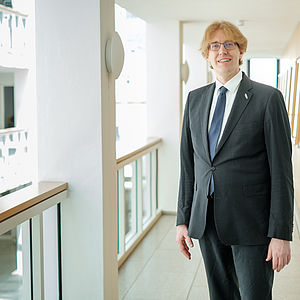"In my research, I focus on the digital economy, especially on so-called internet giants. These kinds of companies wield a major influence on our society – their sway reaches far beyond mere consumption and includes communication and the shaping of opinions. As a result, they are increasingly subject to government regulation – conversely, however, their services are being enlisted by the latter for surveillance purposes (for instance, to counter terrorism and child pornography, but also to enforce intellectual property rights or in the case of simple insults). My interests also include traditional business law, specifically the question of how ads should be designed, including manipulation by "dark patterns". Finally, my research field includes intellectual property law – so that would be the question: whom do software, data or user interfaces actually belong to (and how they should be licensed). This is closely connected to the forthcoming regulation on artificial intelligence and the provision of data security and protection.
An in-depth discussion can only take place in close consultation with computer scientists. My own computer science studies fell through in the end because I was almost entirely tied up by the requirements of the state examination in law. I have continued to programme as a hobby though (among other things, I set up an exam portal for the Faculty of Law and various learning platforms at https://learn.jura.uni-passau.de and https://visilex.jura.uni-passau.de). So, I myself am also affected by the questions I explore from a legal angle. Economics is another science that is also very pertinent to my research – because you cannot talk about regulation in a meaningful way without understanding the natural and efficient processes taking place in a market.
I initiated Germany's first bachelor's programme for legal tech at the University of Passau and combined all three areas into the programme (law, business and computer science). Among other things, this programme gives legal scholars an understanding of how networks and computers work and when their implementation becomes worthwhile – while keeping an eye on the following questions at all times: How do I keep things under control, how to regulate these things, who is liable when errors or misuse occur?”
More about his research
Professor Beurskens studies how algorithms and data are regulated as part of the digital economy. This includes the legal implications of "Industry 4.0" and the legal ownership of data collections and potential liability risk in the context of digital data processing. Besides competition law, his research covers intellectual property rights, especially the protection of patents, databases and (software) copyrights as well as the licences that come with it.


